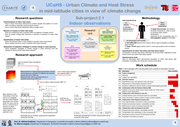Research Module 2.1 Indoor Observations
General
Whereas occupants might be exposed to outdoor heat stress during daytime in mid-latitude cities, they might be affected by indoor heat stress not only during day-time, but also during night-time. Therefore, the research module Research Module 2 "Indoor Climate and Heat-Stress Hazard" is dedicated to the investigation of indoor heat stress during day- and night-time of buildings in densely populated districts of Berlin. Together with Research Module 2.2, which will perform simulations of indoor climate and indoor heat stress, indoor heat stress will be characterised and quantified by the use of different bio-thermal indices. Data of indoor conditions are obtained by measurements.
Research questions
Research Module 2.1 focuses on measurements of indoor heat stress. One main goal is to characterise and quantify indoor heat stress. The gathered data are then used to evaluate reactions of humans to indoor heat-stress and to evaluate different methods to quantify indoor heat-stress hazards. Finally, the results will be used to assess adaptation strategies to climate change in urban planning. Hence, the following questions have been framed:
Characterisation of indoor heat stress
- How is indoor heat stress influenced by outdoor climate and the position of a room within a building, especially during extreme events?
- How is indoor heat stress distributed within a single room?
Reaction of humans to indoor heat stress
- Does air-conditioning have a positive effect on patients in hospital rooms?
- How do people change their behaviour in periods of exposure to indoor heat stress?
Quantification of indoor heat stress
- Which bio-thermal index is most suitable to quantify indoor heat stress?
- Which method should be used to quantify heat-stress hazards?
Assessment of adaptation strategies to climate change in urban planning
- Which adaptation strategies to climate change in urban planning show the capacity to reduce indoor heat-stress hazards?
Collaboration within Research Links (RL)
| 410b | Linkages between indoor heat-stress hazard and vulnerability |
| 420b | Indoor heat stress in hospital, variation of indoor climate for patients |
Collaboration within Research Clusters (RC)
| 510 | From regional weather and climate to indoor and climates |
| 520 | Present-day heat-stress hazards, vulnerabilities and risks | 530 | Effectiveness of actions for reducing heat-stress risks |
UCaHS observation network
An overview of continuous indoor observations and our UCaHS observation network is available here.
